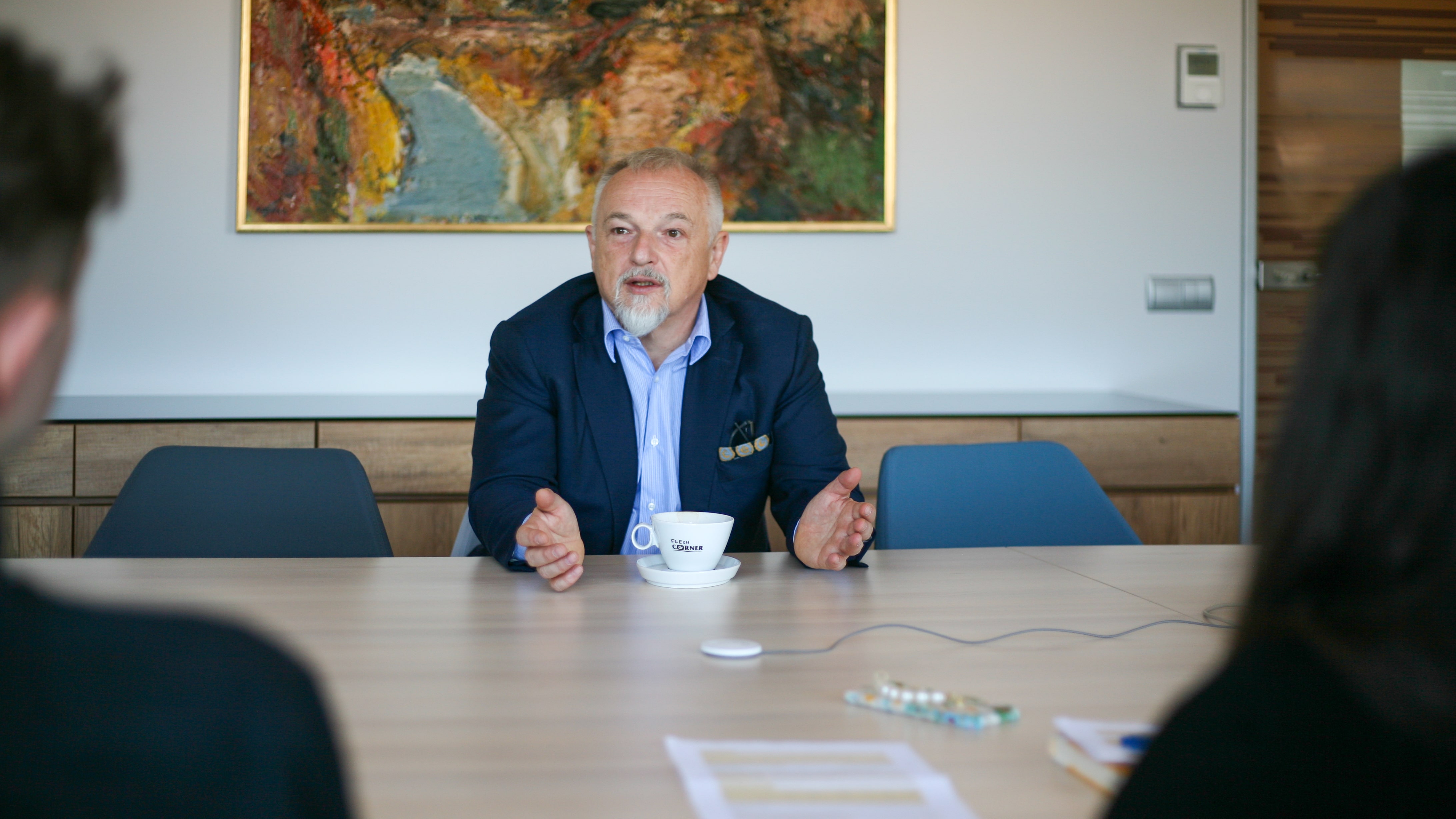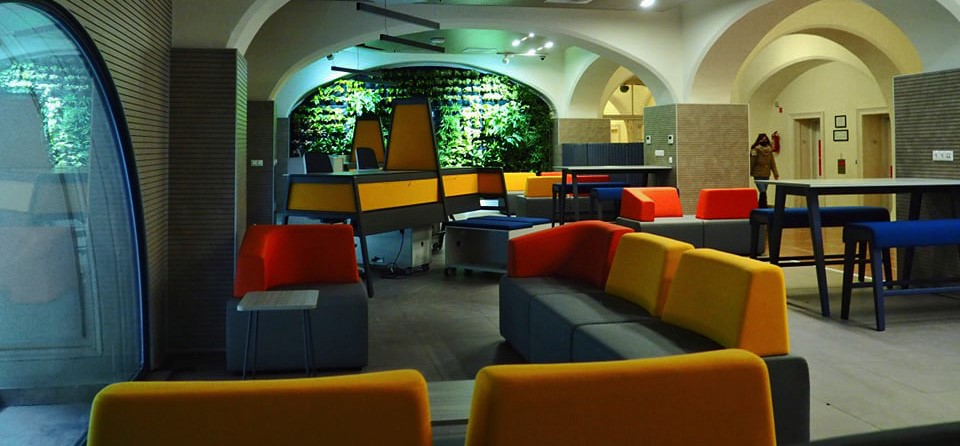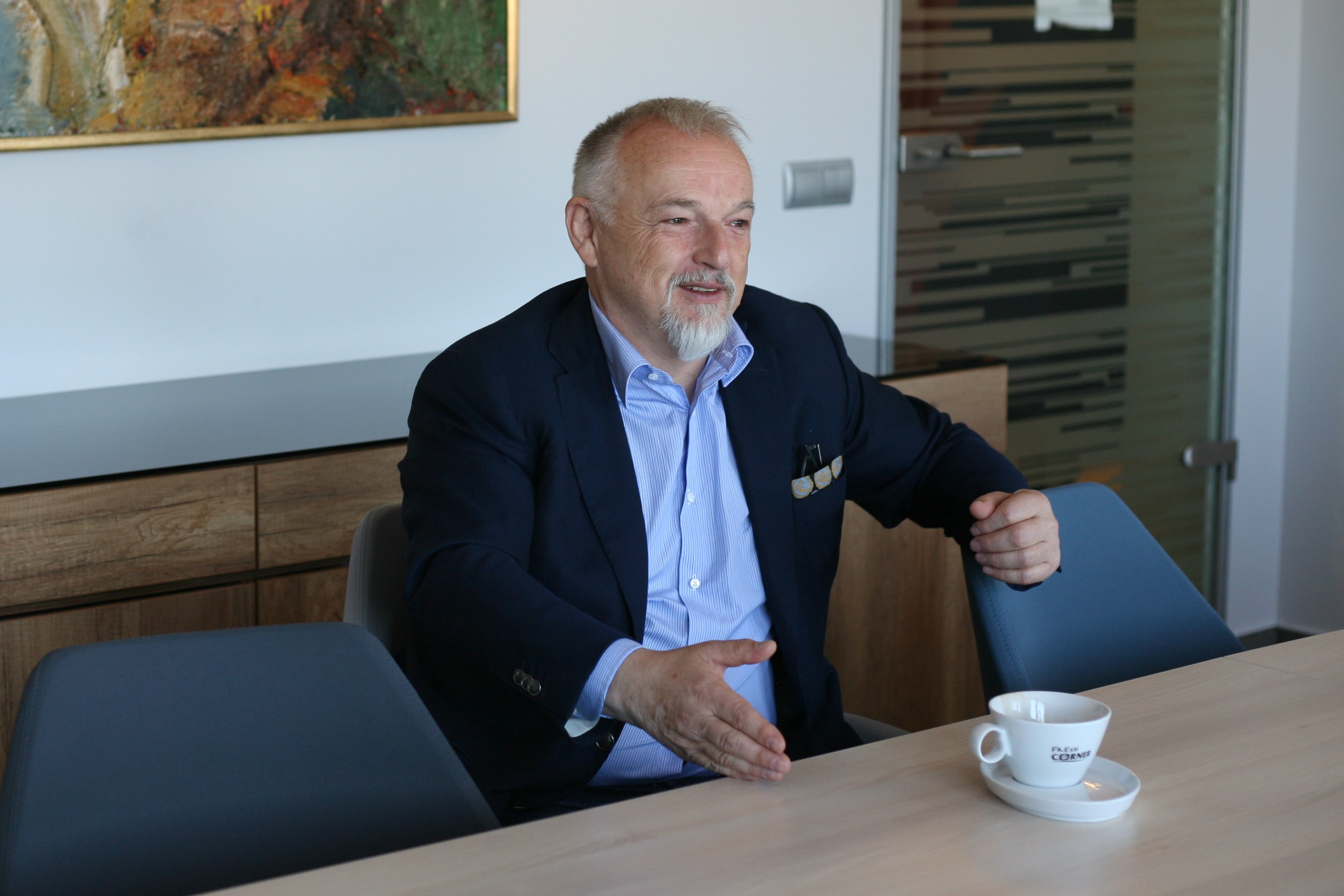Zsolt Hernádi: I make decisions as if my mandate was meant to last forever
Does the model change in higher education reduce autonomy? What sort of experiences did Corvinus University gather after two years in the foundation structure? What does elite training mean, and what happens to those unable to get in? Our interview with Zsolt Hernádi, Chairman of the Board of Trustees, Corvinus University Foundation.

Authors: Belayane Najoua; Máté Kovács; Cover photo: Brigitta Burkus (Economist)
The full interview can be accessed via Közgazdász Online (Economist Online) student blog.
According to the critics of higher education transformation the fact that the Senate only provides opinion on the critical final decisions of the Board of Trustees reduces autonomy. Zsolt Hernádi regards any reference to impairment of autonomy as a false argument. The really important questions are: what, why and for whom they offer. In his view higher education should serve a specific purpose: ‘It is mere l’art pour l’art to believe in the existence of higher education and qualification, while its social usefulness remains questionable. There should be a goal.’
Let alone the fact that quality education costs a lot of money: ‘Whether paid by the individual or society, education has never been given free, nor will it ever be.’
Political entrenchment or long-term reform?
The Board of Trustees of the university foundation is elected for an indefinite period of time, and new members can only be appointed by the Board itself. According to critics of the model change it means unlimited mandates for Board members, impossible to remove in the event a new government takes power.
According to Zsolt Hernádi, the aim was to ensure long-term planning. ‘A political cycle lasts only a number of years, but the decisions of the foundation are made as if membership in the Board of Trustees was meant to last forever. Our decisions are not for the short term. We want major reforms for the more distant future’, says Mr. Hernádi. The transition, however, takes minimum 5, but more likely 10-15 years. The members of the Board bring different attitudes, yet they must share the same values.
In Mr. Hernádi’s view state-funded universities are rather vulnerable to political changes and cycles. ‘If the position represented by the education authority changes every four years, the university must keep adjusting. Nevertheless, the foundation structure guarantees permanence’, Zsolt Hernádi explains.
Also, the education authority has always been powerful, yet without transparency in the system. ‘We rely on a one-over-one principle, according to which the Board of Trustees evaluates the management of the university. It used to be a taboo subject, similar to electing a rector.’
There has never been a genuine professional argument against the model change, he adds. ‘No one has really approached me to discuss the situation with Corvinus. Good or bad? Pros and cons? The Government had asked, wanting to know about the experiences of the first wave before launching the second. But that was all. I have always shared information through various platforms voluntarily, on my own initiative.’

There is still much to improve
‘It is important to note that Corvinus University of Budapest has continued to maintain a high professional standard.’ In Mr. Hernádi’s view the change in authority has given the university genuine freedom, but ‘there are yet some bottlenecks to resolve’, such as the accreditation process to ensure the possibility of launching new training programmes. ‘The lengthy debates take precious time. The market won’t wait forever.’
The dilemma of the two-year master’s programme is a similar issue, he adds. ‘The number of students enrolling for master’s courses offered by Hungarian universities is declining due to unwillingness to go back to school for another two years. So, they find a job instead or choose a university abroad that provides high-quality one-year training opportunities.’
‘We also aim to develop a motivating national and international research environment with emphasis on international publication and producing results relevant for the Hungarian scientific circles’, says Zsolt Hernádi.
Is it possible to run a university as an enterprise?
According to many, university is not an enterprise. In Mr. Hernádi’s view it doesn’t matter whether it is a business, a football team or a school: they share some common features, such as people management and managerial qualities, with 80-90 percent similarity in terms of ambition, performance, motivation, compensation and accountability. Consequently, he finds it important that the Board of Trustees and the management of the University include members with experience in people management and leadership.
Wage development and performance-based assessment are considered essential. ‘It’s still far from perfect, but at least we have made a start. It is an inevitable element of cultural development’, says Zsolt Hernádi.
‘All leaders have an obligation to evaluate colleagues. It never happened before, but now we have appraisal meetings twice a year. We set professional and training objectives at the start of the year, and have individual review sessions halfway through to discuss achievements, and the colleague’s strengths and the specific areas for improvement. Finally, the purpose of the end-of-year meeting is to convert it all into forints in the light of the established bonus and development targets’, Mr. Hernádi explains.
How can I see the impacts of model change as a student?
‘What’s most important for me is that the students with high entrance scores choose Corvinus University, and our existing students are satisfied with a good chance to find a suitable job, and fewer of them decide to take a master’s course abroad’, says Zsolt Hernádi. ‘If it is not the case, then that’s a kind of input too, which requires intervention. If something fails, it must be changed and improved.’
Education is now a global business. ‘It’s like a spiral in Hungary: the number of students deciding to go to a university abroad is increasing. Some businesses are specialised in preparing the most talented students for a fee. The foreign universities compete for these students, and they offer values that are unavailable in the free Hungarian educational system. Quality education and positive student experience is critical in today’s higher education.’

In order to offer positive student experience, the teachers must also be converted. ‘Currently the majority of the teachers regard university as a part-time career, and are forced to take a second or third job as well’, says Mr. Hernádi. ‘The students without full-time university engagements also work to gain some professional experience in the meantime, which is a bad compromise.’
What happens to those who are socially disadvantaged?
Social mobility can be best addressed by means of talent management. ‘MOL is also involved: we encourage teachers already at primary level to support students and to organise competitions in mathematics, physics and chemistry.’ The talent management programmes help students to achieve high entrance scores. ‘MCC is a good example. They set up one college after the other for secondary level talent management. It is the best possible solution to encourage mobility’, says Zsolt Hernádi.
‘The fact that exactly the same thing worked during the socialist era is a paradox. Apáczai was one of the grammar schools in Budapest specialised in helping students. So was the Szent István Secondary Vocational School of Economy in Mester Street. ‘There was once a 14-year old boy, lucky enough to have a teacher recognising his talent and recommending him.’ This is how Sándor Csányi, the current chairman of OTP Bank who according to Forbes is the second richest man in Hungary made it from Jászárokszállás to Budapest.
Therefore, when it comes to high entrance scores, there can be no compromise.
The motivating force of university community is ensured by special colleges and student organisations, personally experienced by Zsolt Hernádi as well. ‘At first I was full of confidence at Rajk College, and I felt like a king. Then I quickly realised that everyone was cleverer than me. When I started talking about a subject, the others asked: Oh, yes? And have you read this? Have you read that? You have to read them all!’

The responsibility of the Elite: Is circular economy the future?
When asked about the number of hours his university engagements require, he laughs: ‘I’m generally advised not to tell, otherwise I might have a pay cut at MOL.’ But in truth, he is the one profiting the most from the whole process. ‘Managing this kind of change freshens up your mind. You get out of your ordinary routine and do something different, and that gives you new ideas. The result of this process is MOL’s new buzzword: circular economy.’
In building the circular economy MOL wishes to rely on higher education as well, such as the joint project with the University of Pannonia: the Science Park created in Nagykanizsa. ‘We gain knowledge in engineering and material science from the University of Pannonia, working toward a better and more efficient circular economy’, says Zsolt Hernádi.
However, circular economy is more than a mere technical issue, therefore Corvinus University could have a significant role in operation and dissemination. ‘For example, we need to understand how we could encourage people to separate waste’. We have measured the distance people are willing to cover in order to dispose of cooking oil. Well, it’s seventy metres. If the collection point is further than that, people just won’t bother. Of course, you could say that the ones with a higher level of awareness still visit the nearest MOL station with an appropriate container, but what percentage of the total population would that make?
‘This kind of change will be a challenge for your generation’, says Mr. Hernádi. ‘Today waste is burnt or buried underground. However, what we burn or bury is no waste, but a resource, a type of raw material. Nevertheless, we burn this raw material in order to mine some more for a great deal of money, rather than recycling it.’